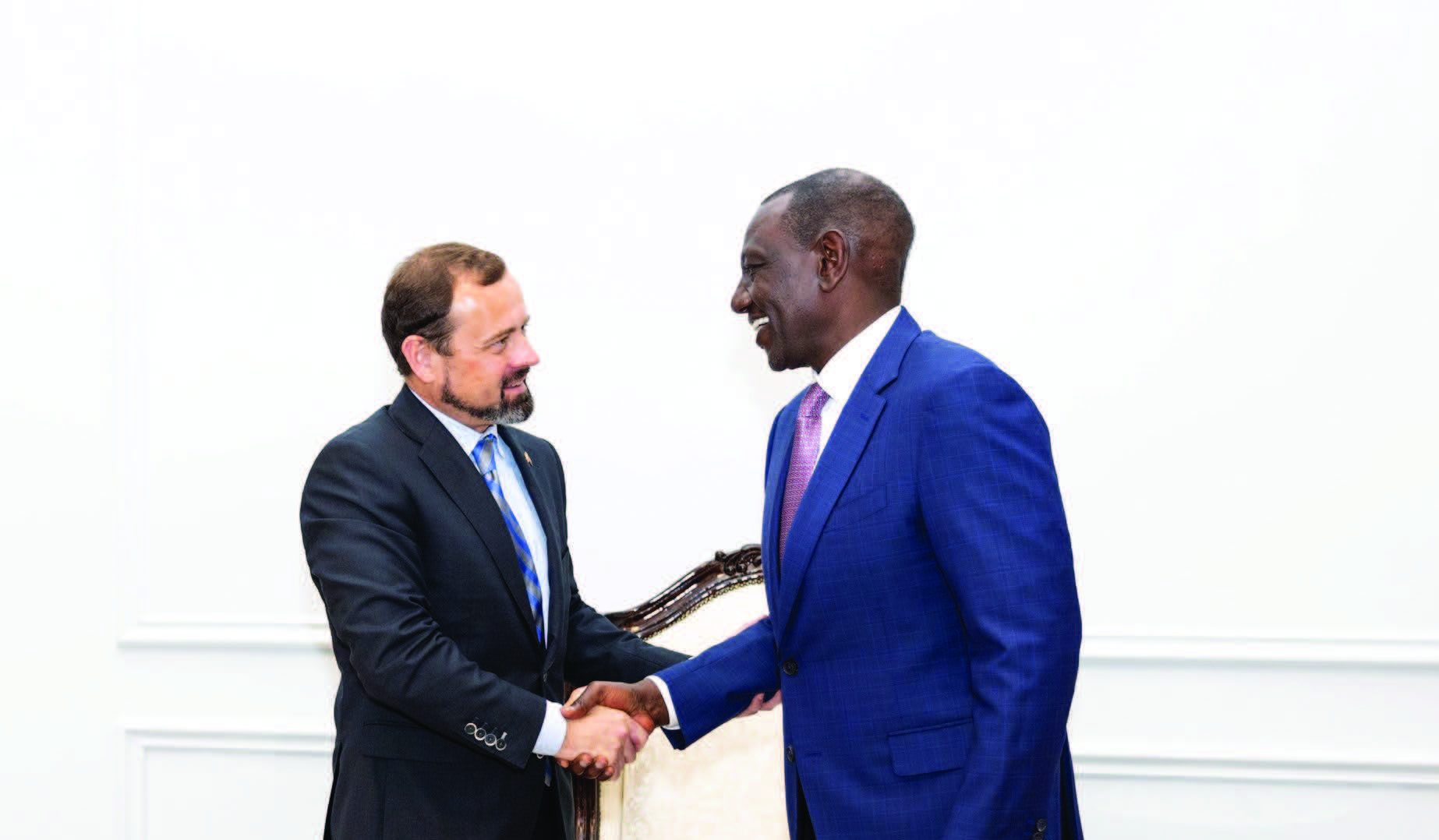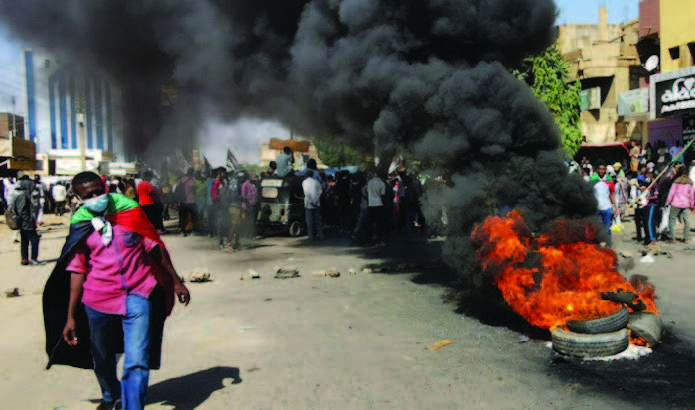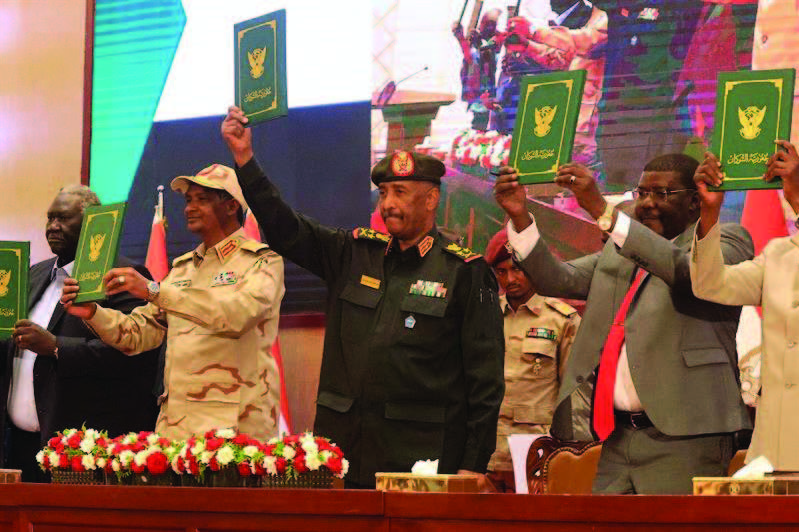
1.0 Introduction
Sudan’s ongoing 13-month war continues to tilt towards genocide, recording the highest amount of displaced persons.[1] This is despite both international and continental efforts to quell the conflict. Over the recent months, the U.S. government has intensified its diplomatic efforts to address the civil war in Sudan. On February 26, 2024, the State Department appointed Tom Perriello as a special envoy to advance efforts to end hostilities and secure unhindered humanitarian access.[2] Perriello’s diplomatic mission took him to Uganda, Ethiopia, Djibouti, Kenya, Egypt, Saudi Arabia, and the United Arab Emirates, where he sought to align international efforts to bring peace to Sudan. On March 26, he announced plans for the resumption of peace talks in Jeddah that were scheduled for April 18, 2024, and were set to be co-chaired by the United States and Saudi Arabia. A pivotal development in these peace efforts is the Nairobi Declaration facilitated by President William Ruto[3] and which highlights a significant step in this direction. This commentary seeks to analyze the Nairobi Declaration and Kenya’s role in mediating the Sudanese conflict.
The Nairobi Declaration, was signed on 18 May 2024 by Former Sudanese Prime Minister Abdalla Hamdok – leading the Tagaddum anti-war civilian group. Others were Abdel-Wahid Mohammed Nur of the Sudan Liberation Movement (SLM) and Abdelaziz al-Hilu of the Sudan People’s Liberation Movement (SPLM)-North. It seeks to promote international humanitarian law by removing impediments to aid delivery and ensure unhindered access for all citizens in conflict zones. Additionally, it advocates for the establishment of a security and military system that meets international standards. The system aims to form a unified national army committed to safeguarding Sudan’s national security interests in accordance with its constitution. Emphasizing the necessity of a federal democratic civilian government in Sudan, which ensures equal participation for all Sudanese in governance and resource allocation, further underscores Kenya’s proactive stance.
By supporting the creation of a unified national army dedicated to upholding Sudan’s security interests, Kenya directly seeks to addresses one of the key underlying causes of instability in the country. This showcases Kenya’s commitment to tackling the structural drivers of conflict and fostering enduring stability in Sudan. Equally important is the Nairobi Declaration’s call for a federal democratic civilian government in Sudan[4], highlighting the interconnectedness and significance of inclusive governance structures, political stability and social cohesion. Kenya’s support for democratic governance forecasts its commitment towards the promotion of accountability and transparency in institutions that serve the interests of all Sudanese citizens. By advocating for equal citizen participation in Sudan’s decision-making processes and resource allocation, Kenya seeks to advance inclusive governance systems while addressing underlying grievances to the ongoing conflict.

However, these peace-building efforts face significant challenges from various regional and global players. For instance, accusations of Kenya’s bias towards Mohamed Hamdan Dagalo, commander of the paramilitary Rapid Support Forces (RSF), by the Abdel Fattah al Burhan faction. One potential remedy to this could be Kenya’s current focus under President Ruto’s administration on collaborating with civil society groups in Sudan. Strengthening these partnerships could help Kenya demonstrate impartiality and build trust among all parties involved. Equally, understanding the complexities of foreign involvement is crucial to addressing one of the war’s most pernicious aspects: the ongoing provision of weapons and support to both sides. In a speech on March 6, 2024 marking the publication of a UN Panel of Experts report, U.S. ambassador Linda Thomas-Greenfield highlighted how the conflict is being fueled by arms transfers from regional powers[5]. Similarly, the U.S. Intelligence Community’s latest Annual Threat Assessment noted that increased foreign military support to Sudan’s warring factions could hinder progress on future peace talks[6].
While the Nairobi Declaration signifies a positive step toward peace in Sudan, its success depends on the goodwill of the concerned parties to engage constructively in the peace process. Kenya must actively support the declaration’s full implementation through various fronts, including diplomatic mediation and technical assistance. Additionally, leveraging its strategic partnership with the United States will be crucial in securing international backing for Sudan’s peace-building initiatives. Kenya’s history of championing regional peace efforts, coupled with its diplomatic influence and strategic positioning, reinforces its role as a credible mediator. The country’s geographical proximity to Sudan, stability, and relative prosperity compared to its immediate neighbors further enhance its reliability as a trusted mediator. However, Kenya’s diplomatic efforts may face challenges. This will include balancing its own interests with those of other stakeholders including IGAD, and states facilitating the Jeddah process and managing internal political dynamics. Addressing these challenges is essential to ensure the sustainability of its peace engagements and contributions to Sudan’s peace-building efforts.

In conclusion, Kenya has made significant strides in fostering peace in Sudan, notably through the Nairobi Declaration, which exemplifies Kenya’s commitment to peace and diplomacy in its foreign policy efforts. However, the complexity of the Sudanese conflict requires a multifaceted approach to ensure lasting stability. Kenya should enhance its diplomatic engagement by appointing a special envoy for Sudan and organizing regular high-level meetings with key stakeholders to maintain a unified approach. Promoting inclusive governance is essential, and Kenya can support this by providing technical assistance to Sudanese political institutions and facilitating dialogue among diverse groups to address grievances. Humanitarian assistance is crucial, and Kenya should work with international organizations to establish humanitarian corridors and support development projects aimed at rebuilding Sudan’s infrastructure.
In addition, Kenya’s role in security sector reform is vital for creating a unified professional national army in Sudan. Offering training programs and supporting disarmament initiatives will help integrate diverse factions and prevent the resurgence of armed groups. Collaborating with regional bodies like the IGAD and the AU, as well as leveraging partnerships with global powers like the US, will be key to garnering international support for Sudan’s peace-building efforts. Finally, establishing a comprehensive monitoring framework to track progress and provide regular reports will ensure transparency, accountability, and the sustainability of the peace initiatives. Through these combined efforts, Kenya can solidify its role as a credible mediator and contribute to lasting peace and development in the Sudan.
2.0 References
[1] Kenya’s new US-backed bid to save Sudan from ‘genocide’, the East African, 2024.
[2] Announcement for a Special envoy for Sudan, US Department of State.
[3] Hamdok, Abdel Wahid, and Abdelaziz sign declaration in Nairobi, Radio Tamazuj, 2024.
[4] Kenya’s new US-backed bid to save Sudan from ‘genocide’.
[5] Remarks by Ambassador Linda Thomas-Greenfield at the UN Security Council Stakeout on the UN Panel of Experts’ Report on Sudan, The United States Mission to the United Nations, 2024.
[6] War threaten US interests in Africa, report says, The East African, 2024.
